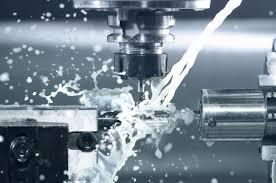Notifications

7 minutes, 30 seconds
-243 Views 0 Comments 0 Likes 0 Reviews

In both the automotive and aerospace sectors, precision is non-negotiable. Every component, no matter how small, must meet stringent specifications to ensure functionality and safety. CNC turning services offer unparalleled accuracy, making them essential to the production of parts like engine components, transmission housings, and landing gear parts. These services use computer-controlled lathes to remove material with micrometer-level precision, ensuring repeatability and consistency across production runs. This level of control minimizes human error and makes it possible to meet the tight tolerances required by these high-stakes industries.
The reliability of CNC turning services also reduces the need for post-production modifications, thus speeding up the entire manufacturing process. For example, in aerospace applications, even the slightest deviation in component size can lead to mission failure or safety hazards. Similarly, automotive manufacturers rely on CNC-turned parts to improve vehicle performance, durability, and safety. The ability to produce intricate geometries with high repeatability ensures that components meet both functional and regulatory requirements. This precision helps manufacturers stay compliant with industry standards such as ISO 9001, IATF 16949 for automotive, and AS9100 for aerospace.
CNC turning services provide unmatched flexibility in working with a wide range of materials, from lightweight aluminum and titanium used in aerospace components to tough, high-strength alloys commonly found in automotive engines. This versatility enables manufacturers to tailor their component design and material selection to suit performance requirements without compromising on manufacturability. The advanced cutting tools used in CNC turning are capable of handling difficult-to-machine materials, which is crucial in industries where performance, weight, and resistance to extreme conditions are key considerations.
In terms of complexity, CNC turning allows for the creation of highly detailed and intricate parts, which are commonly required in both automotive and aerospace applications. For example, turbine blades, fuel injectors, and suspension components often have complex geometries that are nearly impossible to produce using conventional machining techniques. CNC turning machines, especially multi-axis lathes, make it feasible to achieve complex profiles and undercuts in a single operation, increasing productivity while maintaining component integrity. The ability to produce such complex parts efficiently makes CNC turning services an indispensable part of modern engineering and manufacturing workflows.
CNC turning services significantly boost production efficiency by automating various machining processes. Automated systems reduce downtime, limit manual intervention, and enable continuous operation—often 24/7—leading to higher throughput and faster turnaround times. In high-volume industries like automotive manufacturing, where thousands of parts must be produced daily, such efficiency is critical. CNC turning also enables quick changeovers between different part designs through programmable controls, which is essential in industries requiring frequent updates to product lines or custom components for specific models or applications.
In addition to improving production speed, CNC turning services also help manufacturers reduce operational costs. Automated machining minimizes the chances of error-related rework or scrapped parts, cutting down material waste and quality control expenses. Moreover, the reduction in labor costs and the extension of tool life—thanks to precise programming and optimal cutting conditions—contribute to long-term cost savings. For both automotive and aerospace companies, this cost-efficiency supports competitive pricing strategies while maintaining high product quality. As global competition intensifies, these benefits make CNC turning a valuable asset in streamlining production and maximizing profitability.
Innovation is a driving force in the automotive and aerospace sectors, and CNC turning services play a crucial role in bringing new product designs to life. The rapid prototyping capabilities of CNC turning machines enable engineers to quickly test and refine new components before committing to full-scale production. This iterative development process is essential in developing advanced technologies, such as electric vehicle drive systems or next-generation aircraft engines. With the help of CNC turning, prototypes can be produced with the same precision and quality as final parts, ensuring accurate performance evaluation.
CNC turning services also support the shift toward customization and lightweighting, particularly in aerospace and high-performance automotive applications. Engineers can experiment with new designs and materials—like composites and lightweight alloys—while maintaining structural integrity and performance. CNC machines can easily adapt to different shapes and material properties, allowing for continuous exploration of innovative geometries and configurations. This ability to swiftly transition from design to production accelerates the development cycle and helps manufacturers respond more rapidly to market demands and technological advancements.
In regulated industries like aerospace and automotive, compliance with international quality and safety standards is paramount. CNC turning services provide the consistency and documentation required to meet certifications such as AS9100 for aerospace and IATF 16949 for automotive. These standards demand rigorous quality control procedures, from traceability of raw materials to final inspection of finished parts. CNC turning equipment is often integrated with inspection and measurement systems that verify dimensional accuracy in real-time, reducing the likelihood of defects slipping through the production process.
Furthermore, CNC turning services enable complete process documentation, which is essential for auditing and traceability. Each part produced can be logged with its specific machine parameters, tooling data, and material batch information, providing a comprehensive quality record. This level of traceability is vital not only for regulatory compliance but also for identifying and resolving potential issues in the supply chain. By offering both high precision and robust quality assurance capabilities, CNC turning services uphold the high safety, reliability, and performance standards that define the automotive and aerospace industries.

